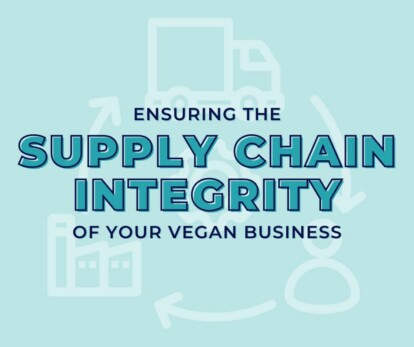My journey to create Fungtn, a more mindful vegan craft beer for conscious consumers


Stating you are a vegan business or organisation to your customers isn’t just a label; it’s a promise. It requires being fully committed to providing cruelty-free and sustainable alternatives.
One challenge with this is ensuring your supply chain integrity aligns with your vegan promise. This can be the thing that makes or breaks a vegan business.
People want to be able to buy from you with complete confidence that there’s no greenwashing going on. They also want to know that their money isn’t going to unethical practices further down the supply chain.
In this blog, we’ll be exploring the key considerations and strategies you can adopt as a vegan business to ensure that your supply chains are plant-based, ethical, and environmentally sound.
To build a genuinely ethical and vegan-friendly supply chain, you must start by thoroughly researching and vetting your suppliers.
Transparent communication is vital; you should openly discuss your vegan values and enquire about the practices of potential suppliers. This includes assessing the plant-based nature of ingredients and the conditions in which they are produced.
Where do products or ingredients come from? How are they obtained or manufactured? How does your supplier check the credentials of their suppliers? How much are workers paid? What conditions do they work in? What issues affect their communities?
These questions are all vital.
An interesting piece in The Guardian recently about why supplier relationships are the key to SME success. One business owner, Sarah Maloy, who founded and runs Shop Zero, a zero-waste shop in Nottingham, UK, highlighted the importance of the above questions.
She gave the example of bamboo toothbrushes, saying that while bamboo is vegan and sustainable in many ways, the cheapest bamboo products often come from a supply chain where people are underpaid and working in poor conditions. She also vets her supply chains for social responsibility to ensure that workers are paid well and looked after.
At Ethical Globe, we believe that when people buy vegan or support a vegan business, it’s with the expectation that no species will suffer in the making of a product or service, and that includes human workers.
One way to ensure the integrity of your vegan supply chain is to understand the different certifications, accreditations and standards currently available.
Some are more stringent and comprehensive than others.
Certifications such as Vegan Society, Certified Vegan, V-Label or Leaping Bunny tend to be well recognised, have exacting standards, and provide consumers with confidence in the ethical and sustainable nature of the products.
As well as deciding whether to obtain these certifications for your business, we recommend talking to your suppliers about their accreditations.
Of course, certification can be expensive, which is why some small businesses decide not to pursue it. For this reason, it isn’t a foolproof way to identify genuinely ethical suppliers, but it’s still worth having the conversation. If they haven’t pursued any accreditation, what’s the reason?
You may also want to decide what or if certifications are non-negotiable for you.
Every business should be in the habit of implementing traceability measures to track the journey of ingredients from their source to the final product. If you’re not already doing this, we’d encourage you to prioritise it.
There are several reasons why supply chain traceability matters beyond product recall or safety issues.
Finding ethical and vegan products and services can be confusing. Today’s ethical consumers have learned to have a degree of cynicism.
As we mentioned in the introduction above, people know that greenwashing happens; they’re aware that sustainability claims made by some businesses, for example, can be performative.
They’re also aware that ethical behaviour doesn’t always extend the entire supply chain length.
Indeed, some supply chains are mired in harmful practices such as child labour, modern-day slavery, conflict goods (the trade of buying and selling non-military goods to promote and perpetuate wars), and debt bondage (where people are forced to work without a salary to repay a debt, a practice closely associated with human trafficking).
As a vegan business, you’ll also want to be confident that animal-based products cannot contaminate. You need to know how raw ingredients, components, materials and finished products are handled and stored at every step of their life cycle.
Researching the ethical credentials of a product or service can take a lot of time and effort. If people trust that you have done the legwork on their behalf, they will feel confident about buying from you and relieved they can shop with a clear conscience.
This transparency builds trust with consumers and enables you to identify and address any potential ethical or environmental concerns with new or existing suppliers.
Connecting with the right suppliers won’t be a ‘one time and it’s done’ conversation. It will probably involve several discussions about values, procurement processes, labour rights, risks of contamination, and much more.
It might be helpful to have some questions in mind:
Of course, the questions you ask will vary according to your business. As you can see, you need to have an in-depth understanding of how each supplier works.
Choosing local suppliers and seasonal ingredients can significantly reduce the carbon footprint associated with transportation. It also ensures ingredients are fresh and grown in an environmentally friendly manner.
There are other reasons to source from local suppliers, too. Together, you can form a trusted local network and referrals to businesses whose ethical credentials have already been checked. This fosters a sense of community that will likely extend to your customers and beyond.
Suppliers are more likely to accommodate requests unique to your business and outside their usual scope if they have an established relationship with you.
Collaboration with like-minded suppliers, industry bodies, and non-profit organisations is a powerful way to amplify the vegan message and create a united front for positive change.
Your collective efforts across the entire supply chain can influence the businesses involved, their customers, and broader industry standards.
You should actively engage with your suppliers to maintain an ethical supply chain. You might even need to guide vegan standards and ethical practices. This may involve workshops, training sessions, or resource sharing.
Education empowers suppliers to adopt and embrace ethical and sustainable practices, creating a ripple effect throughout the supply chain.
Some vegan businesses offer advice, support or consultancy about ethical practices as part of their service delivery. This can be a fantastic way to build your reputation and be seen as your field’s ‘go-to’ person.
Ensuring a supply chain’s ethical and environmental integrity is an ongoing process, so you must build time and methods for monitoring this into your business.
Regular audits, inspections, and evaluations will help you identify improvement areas. Ideally, it will become part of your organisation’s culture to adapt to ever-evolving standards and stay at the forefront of ethical vegan practices.
In a world where consumers are increasingly conscious of their choices, you have a unique opportunity as a vegan organisation to provide products free from animal-based products and create a blueprint for other vegan businesses.
By building transparent, traceable, and collaborative supply chains, you can inspire positive change across industries. As the vegan movement continues gaining momentum, businesses are responsible for ensuring that every step of their journey aligns with the values that drive their mission.
You can arrange your listing in the Ethical Globe Directory here if you are a fully vegan business.